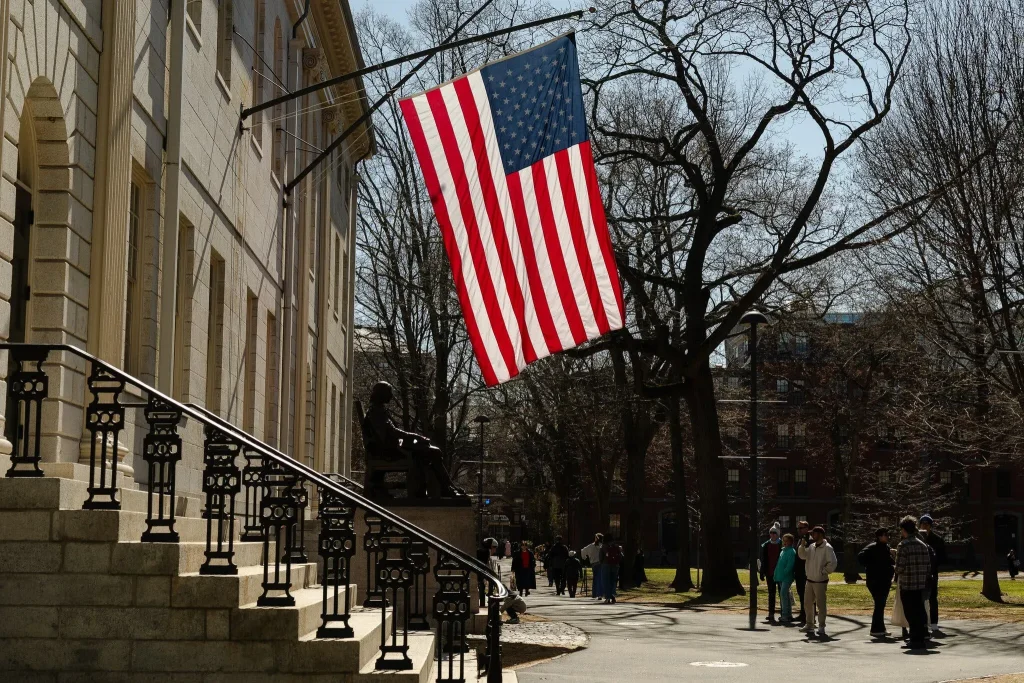Harvard’s tax-exempt status has become a focal point of controversy in recent political discourse, especially amid President Trump’s vocal commitment to revoke it. This move aims to target not only Harvard but also similar elite universities, implicating broader issues such as funding and discrimination on campuses. By claiming that these institutions promote antisemitism, Trump has intensified the ongoing clash with Harvard, making its tax status a bargaining chip in his administration’s strategies. As the IRS investigation into Harvard unfolds, the implications of this dispute extend far beyond the Ivy League, raising questions about political tensions in education and the potential for the tax status revocation to set a dangerous precedent for other educational entities. The outcome could reshape how elite universities operate financially, amidst the scrutiny of their funding sources and governance.
The controversy surrounding Harvard’s financial privileges is symptomatic of deeper issues in the American education system. President Trump’s commitment to challenge the tax-exempt classifications of prestigious institutions reflects a broader disdain for what he perceives as elitism in education. The conflict raises critical questions about the accountability of elite universities, especially regarding their funding and the influence of political pressures on their operational freedoms. This unfolding saga, encapsulated in the debate over tax status revocation, not only highlights the fraught relationship between education and politics but also emphasizes the scrutiny elite universities face in their roles as tax-exempt entities. With the IRS investigation looming and political tensions flaring, the future of Harvard’s financial landscape could have lasting implications for higher education across the nation.
Trump’s Push to Revoke Harvard’s Tax-Exempt Status
The recent announcement by President Trump regarding his intention to revoke Harvard University’s tax-exempt status has reignited discussions about the political influence on elite educational institutions. Trump’s declaration came as part of an ongoing feud with Harvard, rooted in allegations that the university promotes discriminatory ideologies, particularly antisemitism. His claims have brought to the forefront the broader implications of how federal funding and institutional governance are navigated within the prestigious realm of Ivy League schools.
This protest against Harvard is not an isolated incident; it reflects a burgeoning trend in which political figures are increasingly interrogating the tax statuses of institutions they perceive to be politically misaligned. The threat represents more than just a financial penalty; it signifies a potential shift in how educational institutions interact with the federal government and respond to claims of ideological bias.
Furthermore, Trump’s statement that “It’s what they deserve!” underscores a notion that the tax-exempt status must align with a commitment to the public interest, and actively engaging in the ideological landscape is becoming a litmus test. Critics of the administration point out that using tax status as a political weapon can set a troubling precedent. Such actions may foster an environment where educational institutions feel coerced into adhering to specific political narratives, stifling academic freedom and autonomy.
This is a stark reminder of the delicate balance between governance and education, as well as the significant implications that follow when political leaders threaten financial repercussions based on ideological disputes. As this situation evolves, the stakes are incredibly high not only for Harvard but also for the broader educational sector navigating this politically charged landscape.
The Intersection of Taxation and Political Disputes in Education
The debate over Harvard’s tax-exempt status is situated within a wider context of political tensions that are shaping higher education funding. Trump’s threats to withdraw federal grants as part of a campaign against perceived ideological bias reflect how funding can be weaponized in the political arena. His administration’s actions amplify concerns about the IRS’s role in these disputes, especially regarding the purported influence the government may have on tax status revocations based on political motivations rather than legitimate financial or ethical considerations.
Increasingly, the relationship between federal funding and educational governance appears fraught with political implications. Many educational experts warn that utilizing tax exemptions as a tool for politically motivated actions can alter the landscape of academic freedom, prompting other universities to reconsider their stances on controversial issues for fear of retribution. This new dimension of political discourse poses critical questions about the integrity of educational institutions and their funding in a polarized political climate.
As the situation unfolds, the scrutiny placed on Harvard could catalyze broader investigations into how political pressures influence taxation and funding in higher education. The risks associated with Congressional inquiries—especially those led by Senate Democrats—underscore the gravity of these circumstances. A formal investigation into the alleged political motivations behind possible IRS actions could bolster arguments against politicization in educational funding.
This apparent clash signifies a troubling potential future where academic institutions face ongoing scrutiny and pressure from political entities, shaping their internal governance and curriculum decisions instigated by the fear of financial penalties. As elite universities are called to account for their societal roles, the larger question of how political tensions affect education funding remains critically relevant.
IRS Investigations: The Legal Ramifications for Harvard
The potential IRS investigation into Harvard University surrounding its tax-exempt status introduces a complex legal atmosphere where educational institutions could become embroiled in lengthy legal disputes. An inquiry into whether Trump’s administration pushed the IRS to revisit Harvard’s financial standing could have monumental implications. Should the investigation find evidence of political retribution or undue influence, it could set a precedent for future interactions between educational entities and government oversight, leading to a chilling effect across the landscape of higher education.
With legal precedents hanging in the balance, other institutions may find themselves in predicaments similar to Harvard’s, where compliance with government standards becomes secondary to maintaining political favor. This legal scrutiny serves as a reminder of how institutional integrity can be jeopardized when external pressures impact internal practices, offering a cautionary tale for other elite universities to carefully navigate their relationships with governmental bodies.
Moreover, should the IRS’s scrutiny into Harvard’s tax status lead to findings of wrongdoing or misconduct, the ramifications could extend far beyond financial penalties. A ruling against Harvard could signal the start of a domino effect, where other universities with similar funding models face their own investigations. Not only does this present a challenge to institutional credibility, but it also raises questions about the governance of educational frameworks when faced with governmental oversight clashed with political objectives.
The implications for Harvard University and institutions like it are stark; they could be compelled to adjust their operational strategies to protect against potential retaliatory actions. In a landscape where funding often relies on political goodwill, understanding the legalities surrounding tax-exempt status becomes increasingly critical for all educational institutions striving for autonomy and integrity.
Political Tensions Impacting Elite Universities’ Funding Strategies
The political tensions ignited by Trump’s remarks about Harvard’s tax-exempt status reflect a growing divide in the funding strategies of elite universities. Institutions like Harvard often rely heavily on federal grants and support, and a threat to this funding not only endangers their financial stability but also raises existential questions about their academic integrity and mission. This predicament has catalyzed an urgent discussion regarding how universities navigate political pressures, aiming to maintain their educational objectives amidst a rising tide of governmental scrutiny.
The implications of this dispute extend beyond just financial considerations; they affect student enrollment, research opportunities, and community relations. As elite universities grapple with the fallout of political tensions, they may find themselves reassessing their relationships with donors, alumni, and governmental bodies in an effort to protect their mission and fiscal health.
Moreover, the backlash from the broader academic community regarding Trump’s approach to Harvard highlights systemic issues within higher education funding. The possibility of tying funding to ideological alignment fosters a culture of compliance, where elite universities might be incentivized to self-censor, compromising their academic missions. Observers note that as political pressures surge, the resilience of academic institutions is increasingly at risk, with significant consequences for research and development in critical fields. This ongoing conflict makes evident that the financing of elite universities is not solely a fiscal issue, but one deeply intertwined with the foundational principles of freedom of thought and expression.
As the discourse surrounding educational funding evolves, universities must craft strategies that preserve their autonomy while secure from political threats, ensuring that academic environments remain laboratories for innovation and thought leadership.
Implications of Trump’s Immigration Policies on Elite Universities
As Trump’s administration threatens visa revocations for international students, the repercussions for elite universities like Harvard could be far-reaching. These policies add additional pressure on institutions that are already navigating a complex political landscape. International students are vital to the cultural and educational fabric of universities; their presence not only enriches academic discourse but also significantly contributes to funding through tuition. A reduction in international enrollment could subsequently diminish the diversity of thought and innovation within these institutions.
Moreover, the potential loss of international student enrollment leads to financial concerns, as elite universities rely on this demographic for substantial tuition revenue. Schools like Harvard must consider contingency plans to mitigate the adverse effects of immigration policy shifts, such as enhancing recruitment efforts in other countries or investing in international partnerships to bolster their global reputation. This volatile fusion of education and immigration policy illustrates how political decisions ripple through the structures of elite institutions.
The fear of losing federal funding, coupled with increasing barriers for international students, ushers in an era of uncertainty for elite universities. It forces them to balance the pursuit of their educational mission against the backdrop of federal policy implications that can seem capricious. Institutions may feel compelled to alter their admissions practices or academic missions to accommodate politically driven conditions, thereby risking their long-standing commitment to educational equity and diversity.
As universities like Harvard face these challenges, an important dialogue emerges about the role of educational institutions in advocating for equitable policies that favor diversity and inclusion within their student bodies. Ultimately, the intersection of immigration policy and educational funding may redefine the landscape of American higher education, fundamentally impacting how these institutions approach global engagement and inclusiveness.
Responses to Political Interference in Educational Funding
In the wake of Trump’s threats against Harvard, the university’s response underscores a commitment to upholding its educational mission and autonomy. Harvard has firmly stated that there is no legal justification to revoke its tax-exempt status, which has drawn considerable support from various educational stakeholders. This resilience reflects a broader resistance among elite universities against politically motivated attacks aimed at undermining their operational integrity. As they rally against potential government overreach, these institutions strive to protect their roles as bastions of knowledge and academic freedom.
Moreover, this situation has prompted discussions among educational leaders about how best to guard against political interference in funding structures. As more universities publicly decry threats to their financial stability, they may galvanize a collective pushback against government actions that seek to impose ideological constraints on educational practices.
The broader implications of this dispute extend into how educational institutions will strategize and advocate for their operational independence in the future. Faculty, alumni, and student organizations are increasingly vocal about the importance of preserving educational ideals free from political manipulation. Such advocacy plays a critical role in maintaining the separation between government influence and academic integrity, signaling to lawmakers that the interests of educational institutions must be protected from political retribution.
Ultimately, the sustained engagement of the academic community in these discussions will determine the future trajectory of educational funding and governance. If elite universities can effectively articulate their positions against political encroachment, it may pave the way for an environment where educational missions are safeguarded from the upheavals of political turmoil.
The Future of Harvard and Political Dynamics in Education
The ongoing dispute surrounding Harvard’s tax-exempt status will likely have lasting impacts on not only the university itself but also the landscape of higher education in the United States. As this legal battle continues, questions arise regarding the sustainability of public funding models for elite institutions, especially in light of political tensions. Harvard stands at a critical juncture, where its leadership must navigate not just legal challenges, but also the perceptions and realities of its role as a leading educational institution amidst a politicized climate.
Looking ahead, Harvard’s experience may serve as a blueprint for other universities in how to respond effectively to similar threats. It could lead to a call for the re-evaluation of how federal funding is allocated, urging educational institutions to foster more robust advocacy networks which can unite to support their interests against political pressures. This could ultimately determine the survival and authenticity of academic missions across the country.
Furthermore, the future of Harvard and other schools may be characterized by an increased emphasis on collaboration among universities to address these political challenges cohesively. It could prompt a collective reevaluation of how institutions respond to governmental demands while upholding their commitments to academic freedom and public service. Given the turmoil sparked by Trump’s declarations, there exists a unique opportunity for educational leaders to come together and forge new pathways for navigating the complex interplay between politics and education.
As these dynamics evolve, educational institutions will need to remain resilient and adaptable, ensuring that they can weather the political storms while remaining committed to their core missions. In doing so, they will contribute to a healthier educational ecosystem that values both independence and public accountability.
Frequently Asked Questions
What is the current status of Harvard’s tax-exempt status amid the Trump Harvard dispute?
Harvard University currently retains its tax-exempt status despite President Trump’s threats to revoke it. The university asserts that there is no legal basis for such a revocation, and legal action has been taken to protect its funding and status as an educational institution.
How could the revocation of Harvard’s tax-exempt status impact elite universities?
If Harvard’s tax-exempt status were revoked, it could set a concerning precedent for other elite universities. Such a move could jeopardize funding and support for these institutions, potentially leading to increased political tensions surrounding federal funding and governance in higher education.
What are the implications of the IRS investigation into Harvard’s tax status?
The IRS investigation into Harvard’s tax status, prompted by concerns from Senate Democrats about potential political retribution from the Trump administration, could reveal the extent of pressure exerted on educational institutions. Depending on the outcome, it may lead to changes in how elite universities operate within the framework of federal funding and tax exemptions.
What are the broader political tensions related to Harvard’s funding?
The political tensions surrounding Harvard’s funding stem from accusations of antisemitism and discrimination on campus, as voiced by President Trump. These tensions highlight the ongoing conflict between political figures and educational institutions over policy and funding, impacting the overall landscape of higher education in the U.S.
How does the Trump administration plan to use Harvard’s tax status as a political tool?
President Trump has indicated he may use Harvard’s tax-exempt status as leverage against the university and other elite institutions, threatening to withhold federal grants unless his demands are met. This approach aims to exert political pressure on universities to align more closely with certain governmental demands.
What legal actions has Harvard taken in response to threats against its tax status?
In response to threats of losing its tax-exempt status and the potential freezing of federal grants, Harvard University has filed a lawsuit claiming that such actions represent an unprecedented abuse of government power. The university aims to defend its educational mission and safeguard its financial resources.
Why is Harvard’s tax-exempt status being targeted by the Trump administration?
The Trump administration is targeting Harvard’s tax-exempt status as part of a broader conflict over alleged misconduct on campus related to issues like antisemitism. This situation reflects deeper political motivations and attempts to influence how educational institutions engage with federal funding and policy.
What are the potential consequences of revoking tax-exempt status for universities?
Revoking tax-exempt status for universities like Harvard could result in significant financial repercussions, including reduced funding from federal sources and potential challenges to their operational models. This could lead to a reevaluation of how elite universities conduct their educational missions and manage their finances.
How does the legitimacy of Harvard’s tax-exempt status protect its educational mission?
Harvard’s tax-exempt status is crucial for securing funding and maintaining its educational programs. Any attempt to revoke this status could undermine the university’s ability to operate effectively, jeopardizing its commitment to education, research, and public service.
| Key Point | Description |
|---|---|
| Trump’s Statement | Trump announced plans to revoke Harvard’s tax-exempt status, claiming it is deserved due to the university’s actions. |
| Reason for Revocation | Allegations of promoting antisemitism and discrimination on campus. |
| Federal Grants Threatened | Trump threatened to freeze $2.2 billion in federal funding unless his demands were met. |
| Harvard’s Response | Harvard claims the move is an attack on their educational mission and lacks legal basis. |
| Political Reactions | Senate Democrats have called for an investigation into potential political retaliation regarding tax status. |
| Consequences of Dispute | The conflict symbolizes larger issues about governance and funding for higher education in the U.S. |
Summary
The topic of Harvard tax-exempt status has become a contentious issue as President Trump threatens to revoke it, claiming it reflects their failure to act in the public interest. This situation not only highlights the political tensions surrounding elite universities but also raises critical questions about the relationship between government influence and educational institutions. As this debate unfolds, the implications for Harvard and other educational entities could be profound, impacting their funding and operational integrity.



